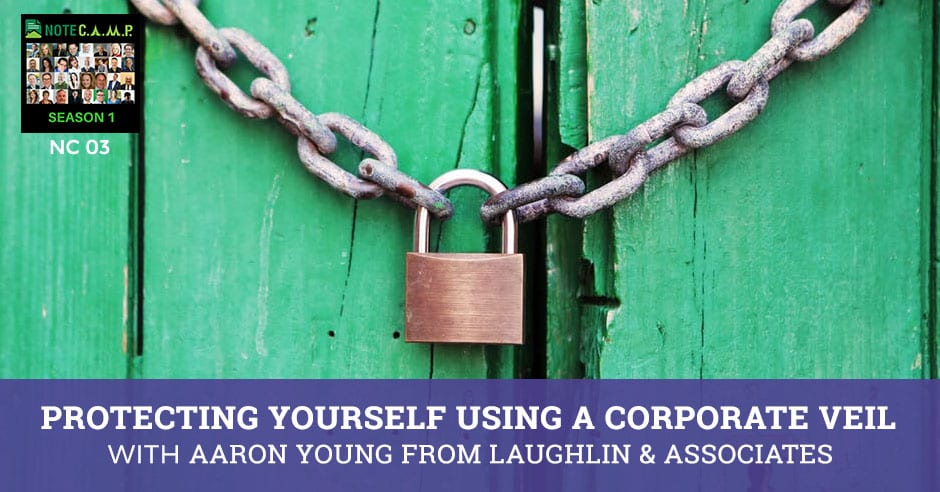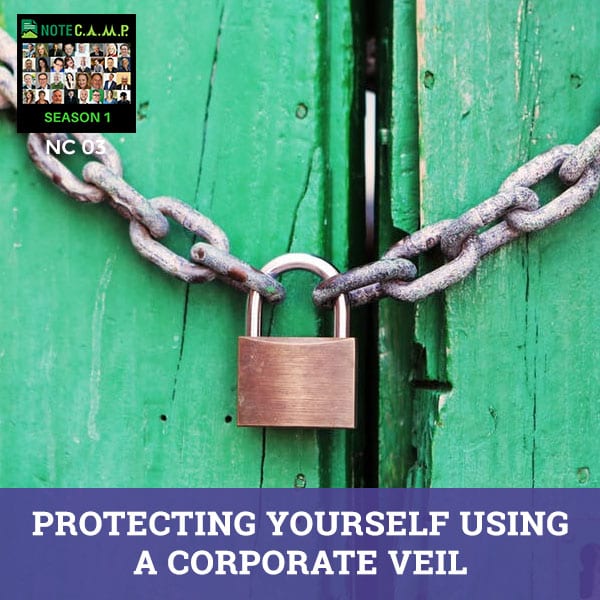
You could get in trouble and even go to prison for something that you “should have known.” Aaron Scott Young went to prison for this and that made him realize the importance of what he does at Laughlin & Associates to make sure you know what the rules are and follow them strictly so you don’t find yourself in a law suit, or worse, prison cell. Once you know the rules, you know the risks and protecting your corporate veil becomes easy. Aaron shares and explains how you can build your corporate fortress when you engage with the public as you do your business.
Listen to the podcast here:
Protecting Yourself Using a Corporate Veil with Aaron Young from Laughlin & Associates
My name is Aaron Young. I’m the Chairman and CEO of Laughlin Associates. We have been, for 46 years, helping over several hundred thousand business owners like you, investors, to protect their assets and to protect everything that they’re working for. We’re going to talk about how to build a fortress around your assets and how to make sure that everything that you’re working on and everything that you’re building right now is going to be safe if there’s ever a challenge. In other words, a lawsuit, an audit, bringing in certain kinds of investment partners or any number of other things where your business could be looked at. We want to make sure that your company is set up properly. There are so many laws that small business owners don’t even know they’re supposed to be following. I want to talk about that and I want to tell you my cautionary story.
Let’s dive right into building your corporate fortress. First of all, we’re going to start off with a story. I don’t always tell this story, but I know Scott loves me to share this story and it’s important and it’s a true story. Back in 2002, this was my little family. My wife Michelle and I celebrated our 31st wedding anniversary. We’d been married last time in 2002.Our four kids, Adam, Zoe, Max, and Chase were little kids. We lived in this great little house. You’ll love this house. We lived in Happy Valley, Oregon, which I think is such a charming name. Life was good, business was good, and I was spending time doing things that I love to do. I was serving on boards and helping. I raised money for the children’s hospital and I was on the theater board and I was doing all this great stuff. Everything was great and then one day, I get a call. It’s just after Christmas, December 27th, 2002. I get a call and my wife and kids and I were at the beach and they said, “Aaron, call your office right now.” I called the office and instead of Kylie, my receptionist, answering the phone, I got special agent in charge. I was talking to this FBI agent and they were joined with members of the criminal enforcement division of the IRS and they were in my office. I said, “What are you doing?” They said, “We’re exercising as search warrant.” I said, “What’s going on?” They said, “We need anything you have about this other guy and his company.”
I could understand this because as much as I thought this guy was an interesting and intelligent guy, we had stopped working with him almost three years before because I thought it was a little on the slippery side. He was living outside the United States, he was not a big fan of the government, and he said a lot of things. I thought he’s going to draw negative attention to himself, “Let’s just be friends but separate.” It had been three years and now here we are with these guys exercising the search warrant in my office, seeking information about him. They wanted to get into my safe and I didn’t want to have them inventory what was in the safe without me being there so I said, “Am I in any trouble at all?” They said, “Nope, not at all.” I drove down to my office but it took about two hours. I opened the safe for them, they look through it and nothing they needed in the safe. Then they said, “Just wait around, we won’t be here that much longer,” and I said, “Okay.” I went in my office and sat down. One of the agents came in and said, “It’s been such a difficult case because he’s hard to pin down. He is in and out of the country. We don’t know how he’s getting in and out of the country. He’s not going through immigration. Would you mind answering a few questions?” I thought, I don’t mind, that’s seems like the right thing to do, so I sat there and answered all their questions. They ask questions for a better part of two hours. Simple stuff, “Do you know this name? Do you know what this acronym means? Do you recognize this signature?” It seemed pretty innocuous to me. Time goes by and they leave. They were very nice and very polite the whole time.

Protecting Your Corporate Veil: Whatever circumstance you’re put in, your brain will adjust.
I called my lawyer and I said, “I had the craziest experience. These guys came in my office and they were asking questions.” He said, “You didn’t talk to them, did you?” I said, “Yeah, I did. I did for two hours.” He’s like, “Aaron, that’s bad. You’ve now sucked yourself into a criminal investigation. You need a criminal defense lawyer.” I said, “Criminal defense? What are you talking about? I didn’t do anything wrong.” “It doesn’t matter. You’re in it now because you’ve talked to them.” I said, “Who do I talk to?” He gave me the name of somebody he thought would be great. It’s this guy, Roger Milton Olsen. He’d been the assistant attorney general of the United States for seven years under Ed Meese, the attorney general. He was running a very successful practice in Washington DC and dealt with the government all the time. I said, “Here’s the problem.” He said, “Good. Let me make a few phone calls.” He comes back, says “They’re not looking for you, Aaron.” We’re at the first week of January ‘03. He said, “You’re not a target. They’re not after you. You’ll get all your files back, nothing to worry about.” Then four months later on April 24th, 2003, my business partner and I were indicted on conspiracy charges, federal indictment on conspiracy. They said we knew or should have known what this other fellow was allegedly up to. I thought, “That’s the stupidest thing I ever heard,” so we went to battle. We started to fight and we hired this guy and we hired another couple of local lawyers who are both high-priced and high profile lawyers and we went to battle. Over three and a half years of battle, we spent about $2 million in legal fees trying to defend ourselves in what we thought was an absolutely insane charge, knew or should have known.
What we did discover after three and a half years and all this expense was that what we’ve been told in the beginning was actually true. The IRS has over a 99.3% conviction rate. If you get indicted by the IRS, you’re almost 100% sure to lose. We’ve exhausted our money and we didn’t see any way to get out of it and it seemed like a never ending battle, so we changed our plea from not guilty to guilty. They let us pick anything we wanted to plead guilty to, they didn’t care what it was as long as it had a 36-month sentence. On the appointed day, my partner and I found ourselves standing in front of Judge Ancer Haggerty, Chief Justice of the Federal Court there in Portland, Oregon in a very interesting experience, a very interesting hearing, which I won’t go into, but there’s a lot more to the story even around the hearing. The bottom line is we were sentenced. We plead guilty and he sentenced us to go to prison. On a beautiful May morning in 2006, my wife and I climbed into our 2002 Mercedes Benz and we drove about an hour and a half to this place, the Federal Correctional Institution of Sheridan, Oregon.
Remember we are at the beach, we own a home at the beach and we have to drive by Sheridan Prison to go to the beach house. We’ve seen this many times and I never thought it looked that bad. I thought for a prison though, it looks pretty good. It’s these coast guard-looking buildings with pretty red roofs and the green grass and the razor wire, even if the sun hits it right it twinkles in the light. It’s beautiful. I have done my research on Sheridan knowing that that was probably where I’d be sent. I found out that CNBC said that Sheridan is one of the best places you can go to prison. I thought, “At least I’ve got that going for me.” I can go to one of the nicest places that go to prison. When you walk in, you see the bunk bed on the back wall. The prison was overcrowded and so there was also a cot in this little cell, seven and a half feet wide by twelve feet deep, the bunk bed, the cot, and the toilet made out of sheet metal. They lock that door and there I was, I spent 30 days locked up, nineteen and a half hour days in this little cell. They’d let us out to eat and to make a phone calls and but nineteen and a half hours a day locked in, which seemed horrible when I say it now. It was terribly scary at first.
It’s interesting to me how you adjust to whatever circumstance you’re put in, your brain will adjust. It didn’t take very long to make peace with the fact that I was in there nonstop with these guys. 30 days at the detention center waiting for my bunk to open up at the satellite camp. After 30 days with these guys, I moved over to the satellite camp. I look out the window and out of the gate and the razor wire and I was there for awhile. My bunk mate, Nick Pyle let me know as soon as I got there, because he was there for eight years. He said, “This is my house, you’re just renting.” I said, “Okay.” He was a tough guy. He was in there for methamphetamine cooking and distributing. He had gang tattoos all over him and brotherhood stuff. This is the guy that I share a bunk bed with and a desk and so we’re together throughout the day. I don’t think the men get it when I say this, but my wife Michelle had shoulder length hair like my girls did but Michelle’s hair kept getting shorter and shorter every time she’d come to visit me. Here at Christmas, about halfway through my stay there, I said, “This was the shortest I’ve ever seen it. Tell me about this fashion statement you’re making with your short hair.” She just looked at me exhausted and said, “I just don’t have time to worry about my hair.” She was carrying the weight of the world on her shoulders. I tell you, the family had in some ways a much harder time than I did.
I was there for fourteen months and one week locked up at Sheridan Prison, not for anything that I had done. They had no problem with my business, no problem with my personal taxes, there was no fraud, there was no restitution to be made, nothing. They said I knew or should have known what somebody else had supposedly done. I didn’t know that you could go to federal prison for something that you should have known. You could be in trouble for something you should have known, but you can. That realization took a lot of the things that we do at my company, Laughlin Associates, and made them very real and very personal to me. Sharing information that business owners, investors, people that have a corporation or an LLC, things that they need to know has become very important to me. It has become my why, why I do what I do, is to make sure that you know what the rules are and are able to follow them so that you don’t find yourself in some incredibly negative situation someday, because if I had a chance to teach you, I’m going to make sure that you know.

Protecting Your Corporate Veil: You could go to federal prison for something that you should have known.
The information I’m going to share may make some of you very uncomfortable. In my live events, I see men and women both get all teary and get scared. I see them texting their business partner or their spouse going, “We’re in so much trouble.” One of the great professional speaker named Steve Farber walked up to me one time and he said, “Aaron, your talk is so much better the second time.” I said, “What do you mean by that, Steve?” He said, “The first time I heard you give this talk, I was so freaked out, I was so scared, that I didn’t notice any of the jokes. I didn’t notice any of the interesting stories. I was just freaking out. The second time was a lot more fun to listen to. By the way, I took your advice and did what you suggested doing.” The good news is that we’re sharing this information with thousands and thousands of business owners every year and helping thousands and thousands of business owners to make sure that they know the rules, and they’re playing by the rules. That’s what my goal is. If you’re engaging with the public, whether you own an operating business like a store or someplace where you employ people or if you’re a real estate investor and you’re buying notes and you’re working with people that are in those homes to restructure their mortgage; or you’re evicting them and maybe putting renters in; or you’re flipping the house or the apartments and you’re working with contractors, whatever it is. When you’re engaging with the public in an effort to buy and sell and trade and make money, there’s inherent risk that comes along with working with other people especially when you’re working in real estate.
I know Scott, whenever I hear him talk, he always says, “It’s not if you’re going to get a lawsuit. If you’re really engage and get serious and start making money in this business, it’s not if you’re going to get a lawsuit, it’s when.” The fact is I’ve owned and run lots of companies in lots of industries, and the more successful you get, the more people want to take pot shots at you. You never have to be afraid of that stuff as long as you know the rules. The danger comes in not knowing the risk. That’s where the danger comes. If you know what the risk is and you acknowledge it, then it’s easy to put up walls and barriers to protect yourself. There’s this inherent risk and that’s why people use corporations and LLC’s to separate themselves, the human being, from this business activity. We use corporations or LLCs so we get lawsuit protection. We get additional tax benefits and protection against creditors. In other words, the company can die and you don’t have to die. The ship can sink and you don’t have to go down with the ship. When you properly organize that business entity, it becomes a separate paper person that has its own obligations and its own responsibilities. The goal is to make sure that there is a clear demarcation between you, the shareholder or the member of the LLC, and the LLC or the corporation itself. We want to make sure that that’s clearly defined, and I’m going to teach you exactly how to do that and make sure that that’s all in place for you. We want to get the benefits that come with owning a corporation or an LLC. If any of you don’t have an LLC or a corporation yet, I’ll give you our way of making sure that that’s taken care of. If you’re jumping into the note business, you’re going to want to have at least one business entity. I want to make it easy for you to get that and I’ll show you that.
Let’s go through the information though. Here’s the deal. The government of this great United States knows completely well that it does not know how to make money. It knows how to take money and to exact money in the form of taxes and other fees and so on. They say, “We know that most of the people in the country don’t want to start a business. They don’t want to go out and risk. They want to have a nice safe job, they’re going to do their thing, they’re going to maybe put some money in a 401k.They’re going to go to work in the morning, come home in the evening and just call it good.” There’s a different group of people however, called entrepreneurs. I would absolutely class investors as entrepreneurs 100%. This little sliver of the population called entrepreneurs, they will take all their savings. They’ll redirect their money from the stock market into real estate. They’ll max out their credit cards. They’ll borrow money from grandma and grandpa. They’ll do whatever they need to do to go make their thing happen. The government says, “We need these people to be successful.” Let me tell you why the government wants you to be successful, because 86% of gross domestic product is created by companies of 50 employees or less, small entrepreneurial businesses. That could be one or two people up to 50, but 86% of GDP, gross domestic product, is from companies of 50 employees or less.
The government needs us 82.6% of new jobs created last year were created by companies of 100 employees or less. Those are considered small businesses. The government says, “We need to give these entrepreneurs lots of incentives to be in business. First of all, we’re going to allow them to build a separate paper person to be responsible for debt and all that thing so the owner doesn’t have to go down with the ship. The captain, the leader, doesn’t have to die with the program. First we’ll let them use a corporation or an LLC to insulate themselves from some of these risks because we know a lot of companies are going to fail. If the company fails, we want the entrepreneur to get back up, dust themselves off and try again.” The government wants to build these Kevlar walls around you and keep you safe because you’re super-valuable. They also say, “We’re going to give you thousands more tax deductions than a sole proprietor or a certainly a normal citizen, W2 employee, thousands more tax deductions and tax credits that are not available to others, but they are available to properly organized corporations and multi-member LLC’s. The government says, “We want to help, we want to keep you safe, we want to get you wealthy so that you’ll keep doing this.”
The key to getting all these benefits is separation. You have to be utterly separate from the business entity. That doesn’t mean you don’t own it, it doesn’t mean you’re not a shareholder, it doesn’t mean that you’re not the director, it doesn’t mean that you’re not the president, it just means that you are making clear, bright lines that say, “This entity is separate from me, the human being.” If you can just learn this one thing, and I even would love it if you would put your hand upon your chest. I dare you to play with me. I’m putting my left hand up on my chest and say with me, “I am not the corporation. The corporation is not me.” Here’s the deal. When you learn that the entity is separate from you and it’s not like, “That’s all my money in there. That’s my computer, that’s my house, and that’s my truck. When you can go get clear about these are assets of a company, the company is something you have control over and tremendous influence over what it does, but it is not you, so your personal estate and your business estate are separate. When you learn that, you will make wise decisions about how to run your business. However, most small business owners don’t learn this. Consequently, they make rookie decisions. They make bad choices that put them into trouble.

Protecting Your Corporate Veil: The danger comes in not knowing the risk. If you know what the risk is and acknowledge it, it’s easy to put up walls to protect yourself.
Corporate formalities. As the owner of a corporation, whether they’re a C Corp, S Corp or LLC, you’re required by law in all 50 states to document major business activities. You’re obligated by law to hold regular board meetings, keep minutes of those meetings, and to pass resolutions for decisions that you make. You are also obligated to issue either stock for a corporation or membership certificates for an LLC. If you have never issued stock or membership certificates to yourself, written on them, taking them out of the book, if you even have a corporate book, take them out of the corporate book and put them somewhere else. If you’ve never received stock or membership with your name on it, then you don’t actually own the business. These are things that we are obligated to do as the business owner. The government says, “If you don’t do this stuff, if you don’t act like a real corporation or LLC, then if you get sued or audited or examined, all of the benefits get stripped away.” They say this is not a separate legal fiction. Legal fiction, these are the terms that are in the law. Legal fiction or I call paper person. They say, “This isn’t separate, this is just Aaron’s alter ego.” All of a sudden you don’t get the corporate protection, you don’t get the tax deductions, that gets stripped away immediately, ending up looking like this poor little dude in the barrel. This is not a good situation folks.
Owning a business and being a business owner comes with big benefits. The government wants to give you huge benefits, but those benefits come with responsibilities. If you want to get all the benefits, you have to follow the rules. The responsibilities are not complicated, but you have to do them and over 95% of the business owners that I’ve ever met, and I have tens and tens of thousands of customers that are business owners and I speak at events every week, maybe multiple times a week in front of hundreds or thousands of business owners, most of them are not following the rules. If you’re brand new to this game, I want you to know the rules going in so you never have to worry about any of the problems, that you can get all the benefits and never worry about the problems, but you got to know the rules. The biggest mistake in our industry, the biggest mistake that we see owners of companies make is their failure to document their business decisions. The formal documents, the minutes, the resolutions, the stock ledger, these are the only thing that prove you and the company are separate. Remember, “I’m not the corporation, the corporation is not me.” The only way to prove that is with what’s in your corporate record book. A lot of people go and they’ll go to Rocket Lawyer, LegalZoom or directly to their secretary of state online and they’ll order a company. They’ll spend $99 or $199 maybe depending on where you go and they get back the articles of incorporation. They get a document that says, “You are now officially incorporated or you’re officially an LLC in this state.”
If that’s what you have, if you do not have the bylaws for a corporation or the operating agreement for an LLC, if you don’t have stock certificates, if you don’t have a corporate minute book, if you don’t have a corporate stock ledger, if you don’t have that, you’re incomplete. Your business is not legitimately set up yet. All you’ve done is pay a fee to the state. If you’re ever examined, they’ll go, “This is not a real company. Let’s figure out how we can do this.” Why does all this matter? Because we’re trying to avoid something called “Piercing the corporate veil.” Piercing the corporate veil basically means somebody comes after you, they sue your business, and they name you or other owners personally. The goal is if the company is improperly organized, then they can go, “We can go right through the company and go right to your household,” then take the equity in your home, take your car, take that painting that you bought some time way back that’s hanging over the couch, take your vacation home, take your kids’ college savings and so on. Piercing the corporate veil is a problem. Wake Forest Law Review says, “Piercing the corporate veil has become the most litigated issue in corporate law today. In every case, the plaintiff’s intent is to get the personal and business assets and at least half the time they win.”
Let me give you a perspective. Every 22 seconds, there is a lawsuit filed against a small business in the United States. Piercing the corporate veil is the most litigated issue of all. Every 22 seconds, the number one thing they want to do is pierce the corporate veil and get the business assets and your personal assets and at least half the time they win. Small corporations and LLC’s are the greatest risk of having their veil pierced. Why? Because they think of everything as being theirs. “That’s my stuff.” They don’t keep minutes of meetings because they don’t have meetings. They don’t pass resolutions for decisions because they think, “Why would I do that? It’s just me. Am I supposed to have a meeting with myself? Am I supposed to get all formal and take roll and, and debate back and forth like some schizophrenic crazy?” I shouldn’t say that. I apologize for saying that. That would be the definition, right? They say, “It’s okay if you talk to yourself as long as you don’t answer back.” If you start to have the real conversation in your head, maybe that’s the problem.
People say, “I don’t think this board meeting stuff applies to me because I’m the only member of the board, so it’d be stupid to have a meeting alone.” The government says, “We don’t care. You have to have the meeting. You have to follow the procedure. You have to document things in a certain format in order to be legitimate. If you want us to take you seriously, act like a serious business.” Let me give you a couple stats. First of all, remember I said every 22 seconds there’s a lawsuit filed? 57% of those lawsuits are against businesses making a million dollars or less, which is like every main street business. Everybody that’s out there and they’re doing whatever they’re doing, they are a landscape maintenance company, they’re a restaurant, they’re a coffee shop, they’re a small architecture firm, they’re a dentist office or whatever. A million dollars is a lot of money. If you’re generating a million dollars in revenue, that’s a big deal, over $80,000 a month. You’re doing well. If you’re a one owner business and you’re bringing in a million bucks a year, you’re probably taking home a fair amount of that. You’re living very well. You’ve put yourself in the top 2% or 3% of income earners in the world.
The government knows however that those little companies that are making a million dollars or less are the ones who flow out the rules, they ignore it all, so they come after you. Commission-based lawyers work on contingency. It’s just commission. Their goal is to identify lawsuits, so they’re going to work based on what they can win. That’s why they want to pierce the corporate veil, so the pot of gold at the end of the rainbow is bigger. Do you think you think any contingency fee lawyer ever works and goes after a homeless person? Even if the homeless person did something wrong to their client, there’s nothing to get. There is nothing to win, except for the shopping cart that was stolen from the grocery store anyway. They only go after targets that look like they have some money to get. They love small business owners because you go out and start accumulating other assets. “I don’t need all this money, let’s buy an apartment building. Let’s buy some notes. Let’s do some things.” That’s where the lawsuits happened. 57% of all the business lawsuits against companies making a million dollars or less.
What about audits? Audits are up against small companies. If you’re $5 million in revenue or smaller, audits are actually up 38% against the smallest companies in the country. $5 million or larger, audits are actually down against those companies. Why? Because the auditors have a quota they’re supposed to meet, and the auditor knows small companies do their own taxes on Turbo Tax, or they use Uncle Fred because he’s super cheap. They have their niece who just graduated law school and is doing divorce law and she’s an associate at some firm doing divorces, “I can just call my niece, I don’t need to hire my own lawyer. She can give me some advice.” When you’re making your financial decisions, especially tax-related decisions based on the cheapest person you can find or doing it yourself and fudging, taking the full automotive deduction even though you’re not keeping a log, taking all those business lunches and dinners that are actually with you and your spouse, which cannot be deducted, but you do it anyway because you’re talking about business stuff. You’ve convinced yourself that it’s okay even though it’s not okay.

Protecting Your Corporate Veil: Piercing the corporate veil basically means somebody comes after you. They sue your business and they name you or other owners personally.
The auditors know small companies are the ones who have very little accountability or oversight from a controller, from a CFO, or from somebody who knows the rules. They’re the ones that fudge and so they’re the ones who get audited. When you get audited, not only can they strip away the deductions and say, “These were not legitimate deductions because you weren’t acting like a legitimate entity.” Not only can they strip those away and say, “You owe this tax now,” but the penalty is 45%. You can get creamed even in a small audit. If they come and say, “We’re going to reverse $25,000 in tax deductions plus 45% penalty because you should’ve paid this way back when, that’s a bad day. It’s a bad day. You don’t want that day. That’s the reality of what’s going on. What do we need to do? First of all, you’ve got to start holding board meetings. You’re obligated by law to hold a board meeting. If you have an actual board of directors, quarterly, live, face to face is probably fine. If it’s just you, you ought to be holding a board meeting once a month, if it’s you and a spouse or you and a business partner once a month because you’re making decisions all the time and there are things that need to be properly documented. The problem is you don’t know what the things are, which makes it challenging, but you do need to start having official board meetings. You need to keep minutes of those meetings, and there’s a lot of letters on this page. Minutes simply say, “On this day, these people got together and talked about this stuff.” That’s all it is. “We had a meeting and here’s what we talked about.” Those are the minutes.
Then you’ll make decisions in those meetings and those decisions need to be written down as resolution. “We’ve resolved as a board to do this thing.” I’ll give you a list of those but resolutions can be something as simple as opening a bank account. Banks are obligated by law to have a board resolution before they can let you open a bank account, and if you didn’t have it when you went into open your corporate account, I promise you they took a blank one out of the drawer or out of their computer, documents, and they had you sign that as a director. I just know they did because it’s the law. It could be that, it could be changing CPA’s, it could be giving yourself a raise, it could be borrowing money, loaning money, or bringing in investment capital. There are tons, hundreds of things that are required by law to be written down as a board resolution before you go and do it as the president or the manager of the business. The bylaws of the corporation say the resolution must be written at or near the time of the decision, not every six months, not once a year, at or near the time of the decision, which means you need to be having board meetings and writing resolutions probably every single month.
What are other things that people do to get their corporate veil pierced? One is they co-mingle funds. They get sloppy with all this. “I’ll use a personal check right now and then I’ll reimburse myself from the company,” or “I’ll use my company check right now and I’ll reimburse myself for my home account,” or “I’ve got a credit card that I applied for. It’s got the company name on it, but I applied for it with my own personal credit. It’s not tied to any corporate credit or even necessarily to the corporate bank account, but I use this credit card only for business.” When you have a credit card that you’ve applied for and you use it only for business, and then when you get your statement and you review the statement, and yet everything was business, what most of us do is we write a check from our corporate account to pay the credit card. This pierces your corporate veil because if you worked for someone else, you would submit your expense account report along with your receipts to the controller at the company. They would review it, they would write you a personal check, you would deposit that in your bank account, and then you would pay credit card bill. We skip it because we say, “I am the company, the company is me, so obviously I can use my business account to pay my personal expense.” This is how you pierce the corporate veil.
It’s critical that when you sign anything on behalf of your company that you use your title, like President. CEO is not a title. Treasurer, secretary, director, president, or manager if you’re an LLC, those are titles. You’ve got to keep your company in good standing with the state. Don’t let it go late because they look at that and say, “You’re not real.” This is what most of us do, just nothing. We do nothing. Why? Why do we nothing? Because people say, “Nobody’s ever going to look at my stuff. They’re never going to look at my record book. I don’t need a record book,” or “Nobody’s going to sue me. I’m a nice person. I’m not doing anything wrong.” Believe me, when I was talking to those federal agents, it didn’t even occur to me to call my lawyer because I was a nice guy. I wasn’t going to do anything wrong. I couldn’t be in trouble. I’m willing to help. My willingness got me in jail. I’m brand new. I have just incorporated. I have a brand new LLC. Nobody’s going to come after me. That means nothing. The age of the company means zero. “I’ve been told that LLC’s don’t have to do this stuff.” Let me tell you this. Statutorily, that means the way the law was written, LLC’s don’t have to do corporate formalities. However, in 49 of the 50 states, South Carolina is the exception, there’s case law saying that LLC’s, even one-member LLC’s, are required to do board formalities.
In South Carolina, the only exception is one-member LLC’s don’t, multi-member LLC’s do and then all the other states, even one-member LLC’s do have to do board meetings, write minutes, pass resolutions, issue membership, and so on. People say, “I’ll never get audited. I’ll never get sued.” I hope you never do. It’s an unpleasant experience. “I’ll have my lawyer do this. I’m sure my lawyer does this for me.” I’m now speaking to 99.99% of you. There is always the chance of an exception, and don’t be offended when I say it this way, but you don’t have a lawyer. You know a lawyer, you are friends with a lawyer, you go to church with somebody who’s a lawyer, you have a relative who is a lawyer, but you probably don’t have a lawyer on retainer or working inside your business. I talk to lawyers every single day and lawyers don’t solicit to do this work for you, to do your corporate formalities or to help you with your meetings, minutes, and resolutions. They don’t do it. You know why? They don’t want to do it, and they know you don’t want to pay them $400, $500 an hour to do a one-page document that says that you opened a bank account. They know that, that’s why they don’t solicit for the business. They want to do contracts, they want to do more expensive stuff, binding stuff. They don’t want to do this. That’s why over a hundred law firms send us their clients so that we can do this work for them because the lawyer knows it’s important and knows the client will not do it.

Protecting Your Corporate Veil: Lawyers don’t solicit for the business. They want to do contracts, they want to do more expensive stuff.
If you’re a do-it-yourselfer, you can say, “Aaron, I believe everything you’re telling me, I see that I need to be more diligent about keeping my corporate records, I’m willing to jump in now,” because I know most of you have not done them. If you have an entity, you probably have not done this work, and if you don’t have an entity yet, this may be scary, like “Maybe I don’t want to be incorporated if I have all this pressure.” You don’t need to be afraid of that at all. What you what you can be is you can rest easy and be comfortable in the knowledge that by simply knowing the rules and following them, the rules will protect you. For the do-it-yourselfers out there that says, “I’m going to do it myself.” You can absolutely do this yourself, you just have to get dedicated to learning everything that needs to be documented. I want to give you at least the highlight, at least the most common things. This is a very short section of a long list of about 300 different items that need to be documented, but for the do-it-yourselfers out there, I wanted you to be able to at least see some of the most common things that may need to be documented officially as a board resolution. I know this is a long scary list. Here’s the question. Are you in compliance? If you are sitting there twitching or sweating or the hairs up on the back of your neck, just know you’re in good company. Over 95% of the people I meet are utterly out of compliance. If the water is calm, it’s not a problem. The problem is when the water gets wild when the storm comes.
If you failed to keep proper corporate records and if you’re ever sued, you have a 50% to 94% chance of losing your personal assets in order to satisfy a judgment. 50% to 94% chance of losing your personal assets to satisfy that business judgment. What we want to do is get the proper documentations in place so that they can’t pierce through your company. If it comes at you through your family, let’s say your kid goes out and rear-end somebody and they find out that mom or dad has a bunch of property they own or a successful company, they decided, “We’re going to sue the family.” Even if somebody that get sued that way, if the documents are in place, they can’t get through to your business. I had a client go through this a few years ago. I see this guy, I’m going to speak at an event, and I’m walking briskly to get to backstage because it’s getting close to what I’m supposed to go on. I see this man coming down the hallway at the hotel in the big wide convention center area all bent and broken on the crutches that look like these are his permanent crutches. He stops me as we pass each other in the hall and he said, “Aaron, can I tell you something?” I didn’t recognize this fellow at all, but I said, “Yeah, sure. Hi, how are you on?” I’m trying desperately to look into the man’s eyes and not look at as crushed and broken body. He said, “I want you to know that I listened to your talk a couple years ago and I became one of your customers and use you. Then there was a car accident and that’s what happened to my body. I was in this terrible car accident. People were hurt. A lot of damage. I was at fault in the accident, and they sued me and they took everything I owned.
They took our home, they took our savings, they took our cars, they took everything we had and I felt horrible as the husband and father. What am I going to do to take care of my family? Aaron, they couldn’t take my business. They couldn’t take my company because I had everything organized so they couldn’t pierce the corporate veil. Even though I had to lose everything I owned a personally, my business was safe, which meant I could still get a paycheck. I could go rent a new place for us to live. I could buy the food and everything else that we needed as a family. We could do that. I just want to say thank you for teaching that day about getting your corporate documents in place.” Sometimes it comes not through the business, but it comes through some unexpected thing through your household. Like this fellow said, they couldn’t take his company because they couldn’t pierce through the corporate veil. That’s what I want for you guys. I want all of you to have that same safety and protection and no matter how far behind you are, no matter where you are right now, no matter if you’ve never done anything, it’s all fixable. It’s all easily fixable until it’s not fixable. When I say not, if a problem arises, everything goes on hold until you sort through the problem. You might have to go through the audit or the lawsuit and then even if you get wiped out in that, you’ll come back and say, “Now I’ve got to start over and I’m never going to put myself in that position ever again,” but right now, it’s all fixable as long as you let yourself be fixed.

Protecting Your Corporate Veil: Banks are obligated by law to have a board resolution before they can let you open a bank account.
We have something called the Corporate Veil Protection Service. It’s a do-it-for-you program that we do for tens of thousands of companies. Basically we get on the phone with you every month and interview you and ask you questions. If you’re willing to get on the phone for five minutes a month, maybe ten minutes if it’s been a busy month, we’re going to help you with a bunch of stuff. We’re going to make sure that your corporate formalities and your minutes and resolutions are organized, your Stock Ledger is organized, your business records are all organized into logical, consolidated, proper format. We’re going to build a history of the company by doing these proper board meetings, eliminating your risk from having your corporate veil pierced by the IRS or by the courts or by creditors or other never-do-wells who want to do you harm. The corporate veil service makes sure you keep your company in good standing with the state and actually with Fed as appropriate. It’s going to streamline how you do things, how you organize things as a business, and it’s going to definitely make sure the record keeping part is a streamlined and done properly.
When you join the Corporate Veil Protection Program, this do-it-for-you service, not only do you get that corporate veil of protection, we’re calling you every month asking you questions, creating unlimited numbers of documents, whatever needs to be done, we’ll do it. From one to 100, it doesn’t matter, because our commitment is to make sure you’ve got everything documented properly. Not only are we going to be doing that, we interview you, we create the documents, we email them back to you, you sign them, and put them in your corporate record book. If you don’t have a record book, you’re going to get one as part of this. Not only do you get that, but you also get access to our private membership site called the Laughlin Academy, which is full of everything you’d ever want to know about questions about running a company as far as the corporate part of it is concerned. All kinds of videos, eBooks, webinars, cheat sheets, all kinds of cool stuff in the Laughlin Academy. It’s only $500 a year.
Important Links
- Laughlin Associates
- Steve Farber
- Rocket Lawyer
- LegalZoom
- Wake Forest Law Review
- Corporate Veil Protection Service
- WeCloseNotes.com
- Scott Carson Facebook
- Scott Carson Twitter
- Scott Carson LinkedIn
- We Close Notes YouTube
- We Close Notes Vimeo
- Scott Carson Instagram
- We Close Notes Pinterest
About Aaron Scott Young
 Aaron Young, CEO of Laughlin Associates, has been empowering business owners for more than 20 years to build strong companies and proactively protect their dreams. An entrepreneur with several multi-million dollar companies under his own belt, Young has made it his life’s work to arm other business owners with success formulas that immediately provide exponential growth and protection.
Aaron Young, CEO of Laughlin Associates, has been empowering business owners for more than 20 years to build strong companies and proactively protect their dreams. An entrepreneur with several multi-million dollar companies under his own belt, Young has made it his life’s work to arm other business owners with success formulas that immediately provide exponential growth and protection.

